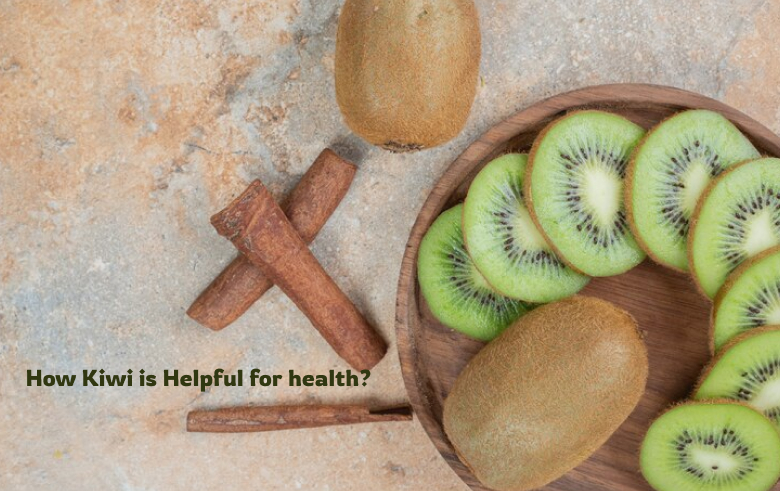
Kiwi, scientifically known as Actinidia deliciosa, is a small, vibrant green fruit with a fuzzy brown skin and tiny black seeds in the center. This unassuming fruit is a nutritional powerhouse and offers a wide range of health benefits. Here’s a description of how kiwi is helpful for health:
Rich in Vitamins and Minerals:
Vitamin C: Kiwi is renowned for its exceptionally high vitamin C content. In fact, it contains more vitamin C per gram than most other fruits. Vitamin C is an antioxidant that supports the immune system, promotes healthy skin, and aids in wound healing.
Vitamin K: Kiwi is a good source of vitamin K, which is important for blood clotting and bone health.
Vitamin E: This vitamin acts as an antioxidant and is beneficial for skin health.
Folate: Kiwi provides a significant amount of folate, which is crucial for cell division and the formation of DNA.
Potassium: Kiwi is rich in potassium, which helps regulate blood pressure and supports heart health.
Copper: Copper is essential for various metabolic processes in the body, and kiwi contains a moderate amount of this mineral.
High in Dietary Fiber:
Kiwi is a good source of dietary fiber, which aids in digestion, helps prevent constipation, and supports a healthy gut microbiome Buy Super Vidalista and Vidalista 20 . Fiber also plays a role in regulating blood sugar levels and can contribute to weight management.
Dietary fiber is an essential component of a healthy diet, often referred to as roughage or bulk. It encompasses the indigestible parts of plant foods that pass through the digestive system mostly intact. Foods high in dietary fiber, such as fruits, vegetables, whole grains, legumes, and nuts, offer numerous health benefits.
Fiber aids in digestion, helps maintain bowel regularity, and can contribute to weight management by promoting a feeling of fullness. Additionally, it plays a role in regulating blood sugar levels and lowering cholesterol, reducing the risk of heart disease and type 2 diabetes. Including fiber-rich foods in your diet supports overall well-being.
Antioxidant Properties:
Kiwi is loaded with antioxidants, including vitamin C and vitamin E. These antioxidants help combat oxidative stress in the body, which is linked to various chronic diseases and aging.
The presence of phytochemicals like flavonoids and carotenoids in kiwi contributes to its antioxidant activity.
Antioxidant properties refer to the ability of certain compounds or substances to neutralize harmful molecules called free radicals in the body. Free radicals are highly reactive molecules that can damage cells and contribute to various health issues, including aging and chronic diseases like cancer and heart disease.
Antioxidants, found in various foods such as fruits, vegetables, and nuts, help protect the body by counteracting the effects of free radicals. Common antioxidants include vitamins like vitamin C and E, minerals like selenium, and phytochemicals like flavonoids and polyphenols. Including antioxidant-rich foods in your diet can support overall health and reduce the risk of oxidative stress-related conditions.
Supports Heart Health:
The potassium, fiber, and antioxidants in kiwi contribute to heart health. Potassium helps regulate blood pressure, while fiber can lower cholesterol levels.
Kiwi’s high levels of vitamin K also support cardiovascular health by helping to prevent calcification of arteries.
Boosts Immune Function:
The exceptional vitamin C content in kiwi is known for its immune-boosting properties. Regular consumption of vitamin C-rich foods like kiwi can help reduce the severity and duration of colds and other infections.
Skin Health:
Vitamin C and vitamin E, both found in kiwi, play a crucial role in maintaining healthy and radiant skin. These antioxidants help protect the skin from damage caused by UV radiation and pollutants.
The vitamin C in kiwi is also involved in collagen production, which is essential for skin elasticity and reducing the appearance of wrinkles.
Aid in Digestion:
Kiwi contains an enzyme called actinidin, which can help break down proteins in the digestive system. This enzyme may assist in the digestion of protein-rich foods and alleviate symptoms of indigestion.
Weight Management:
The combination of dietary fiber and low-calorie content in kiwi can be beneficial for those looking to manage their weight. Fiber helps create a feeling of fullness, reducing the likelihood of overeating.
Eye Health:
Kiwi contains carotenoids, including lutein and zeaxanthin, which are beneficial for eye health. These compounds help protect the eyes from age-related macular degeneration and cataracts.
Eye health is crucial for maintaining clear vision and overall well-being. Proper eye care includes regular eye exams to detect issues like myopia, hyperopia, astigmatism, and age-related conditions such as glaucoma and cataracts.
A balanced diet rich in vitamins and antioxidants, particularly vitamin A and omega-3 fatty acids, can promote good eye health. Protecting your eyes from harmful UV rays by wearing sunglasses and taking regular breaks from screens can prevent eye strain.
Avoiding smoking and managing conditions like diabetes also contribute to preserving vision. Maintaining optimal eye health is essential for a high quality of life and daily functioning.
Anti-Inflammatory Properties:
Some studies suggest that kiwi may have anti-inflammatory effects, which can be beneficial for individuals dealing with chronic inflammatory conditions.
Incorporating kiwi into your diet is a flavorful way to reap these health benefits. You can enjoy kiwi by eating it fresh, adding it to fruit salads, blending it into smoothies, or using it as a topping for yogurt or cereal. With its delicious taste and impressive nutrient profile, kiwi makes a delightful and nutritious addition to any meal plan.